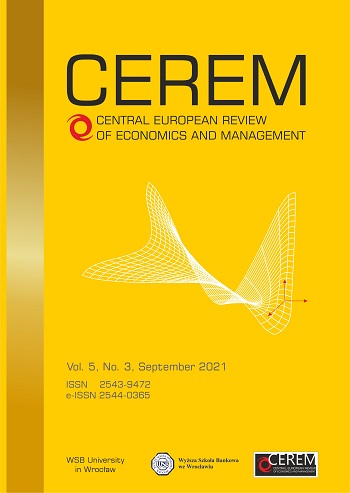Building certain knowledge based on the intentional-consequential gap in uncertain surroundings
DOI:
https://doi.org/10.29015/cerem.916Keywords:
intention to consequence gap, knowledge, uncertainty, system approach, economic state, paradigm, research programme, game theory approachAbstract
Aim: Develop a methodological approach to reduce uncertainty of knowledge necessary for decision making in quick changing surroundings.
Research methods: The research method is heuristic supported by the research programme in Lakatos’ sense, specially designed for these purposes based on the good paradigm of minimization the intentional consequential gap (ICG).
Findings: The ICG is an interesting object related to the “is-ought problem” in Hume’s sense, representing the difference of resulting consequences and achievements of the intention after its realization. Any kind of minimization of the ICG may be recognized as a good paradigm in Kuhn’s sense suitable to build certain knowledge in the uncertain surroundings. So, it is the base of research programme in Lakatos’ sense which is a kind of filter for certain judgements about facts. It is crucial for decision making processes based on uncertain information and knowledge. In this paper a methodology of introduction the research programme based on the minimum ICG is presented.. Currently this method of inferring may be used for building the certain knowledge about rationality of decisions regarding dealing with COVID-19.
Value of the paper: The paper presents an original method of setting the criterion of rationality of any social projects and some axiological evaluations of, among other things, prognoses and strategies.
References
Barnard C., Simon H.A. (1947), Administrative behavior. A study of decision-making processes in administrative organization, Macmillan, New York.
Bertalanffy L. von (1968), General system theory. Foundations, development, applications, Braziller, New York.
Black M. (1964), The gap between ‘is’ and ‘should’, “The Philosophical Review”, no. 73, pp. 165-181.
Book J., Bjørnskov C. (2021), Lockdowns don’t prevent coronavirus spread, AIER, Jan 12, https://www.aier.org/article/lockdowns-dont-prevent-coronavirus-spread/ [11.06.2021].
Burns T., Stalker G.M. (1961), The management of innovation, Tavistock, London.
Carnap R. (1995), An introduction to the philosophy of science”, Gardner M. (ed.), Dover Publications Inc., New York.
Gospodarek T. (2009a), Representative management as a rational research program in Kuhn-Lakatos-Laudan sense, “International Journal of Economics and Business Research”, vol. 1 no. 4, pp. 409-421.
Gospodarek T. (2009b), Modelowanie w naukach o zarządzaniu oparte na metodzie programów badawczych i formalizmie reprezentatywnym, Wydawnictwo Uniwersytetu Ekonomicznego we Wrocławiu, Wrocław.
Gospodarek T. (2012), Aspekty złożoności i filozofii nauki w teorii i praktyce zarządzania, Wydawnictwo WWSZiP, Wałbrzych.
Gospodarek T. (2015), Systemy ERP. Modelowanie, projektowanie, wdrażanie, Helion, Gliwice.
Gospodarek T. (2018), Biała księga zarządzania, Difin, Warszawa.
Kahneman D., Slovic P., Tversky A. (1982), Judgment under uncertainty. Heuristics and biases, Cambridge University Press, New York.
Kuhn T.S. (1970), The structure of scientific revolutions, 2nd ed., The University of Chicago Press, Chicago, London.
Lakatos I. (1978), The methodology of scientific research programmes, in: Philosophical papers, vol. 1, Worall J., Curie G. (eds.), Cambridge University Press, Cambridge, London.
Laudan L. (1983), The demise of the demarcation problem, in: Cohen R.S., Laudan L., Physics, philosophy and psychoanalysis. Essays in honor of Adolf Grünbaum, “Boston Studies in the Philosophy of Science”, vol. 76, pp. 111-127.
Popper K.R. (1934/1959), The logic of scientific discovery, Routlege, London, New York, https://books.google.pl/books?id=Yq6xeupNStMC&printsec=frontcover&redir_esc=y#v=onepage&q&f=false [11.06.2021].
Simon H.A. (1957), Administrative behavior, Free Press, New York.
Taleb N.N. (2007), The Black Swan. The impact of the highly improbable, Penguin, London.
Will M. (2020), The CoViD-19 pandemic and the end of corporate risk management as we know it, “Central European Review of Economics and Management”, vol. 4 no. 3, pp. 89-115.
Downloads
Published
Issue
Section
License
The aim of CEREM is to make scientific work available in accordance with the principle of open access. The rules mentioned below are important, as they enable CEREM and its publisher, the WSB Merito University in Wroclaw, to distribute the scientific work to a wide public while complying with specific legal requirements, at the same time protecting the rights of the authors.
The author transfers to the WSB Merito University in Wroclaw, free of charge and without territorial limitations, with all proprietary copyrights to the said piece of work in the understanding of the act of 4th February 1994 on copyrights and derivative rights (Journal of Laws of 1994, no. 24, item 83, as amended) on an exclusivity basis, i.e. the rights to:
1. Make the piece of work in question available via the Digital Library established by the WSB Merito University in Wroclaw.
2. Produce, record and reproduce in multiple copies the piece of work using any techniques whatsoever, including printing, reprography, magnetic recording and digital processing, and particularly its reproduction by recording on CDs and similar data carriers,
3. Use fragments of the piece of work for promotional purposes in publications, promotional materials, the Internet and Intranet type networks managed by the WSB Merito University in Wroclaw.
4. Store the piece of work into computer databases managed by the WSB Merito University in Wroclaw.
5. Copy and reproduce the piece of work using photo-mechanic technologies other than those commonly known at the time of the signature hereof (photocopies, Xerox copies etc.),
6. Process the piece of work, transferring it into an electronic form, and distribute it on the Internet without limitations.


